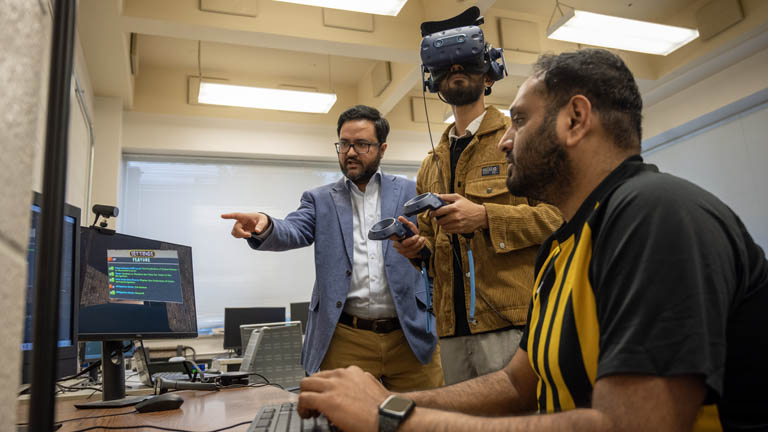April 07, 2025
Advances in AI are escalating the arms race between cyberattackers and defenders.

At Mizzou Engineering, faculty and students leverage their passion and expertise to unlock a better future for everyone.
Khaza Anuarul Hoque, an assistant professor in the Department of Electrical Engineering and Computer Science, is driving innovations through his research in the Dependable Cyber-Physical Systems laboratory that will enhance the security and safety of next generation technologies.
Artificial intelligence (AI) and extended reality (XR) — immersive technologies that combine virtual reality and augmented reality — are revolutionizing technology surrounding defense, health care, education, entertainment and business. By 2029, Hoque estimates the XR market will be worth $30 billion.
“People have only just begun exploring applications of AI and XR,” he said. “There are so many real-world applications, from AI in autonomous driving to manufacturing to XR on the battlefield.”
But that growth comes with risks. AI and XR can collect vast amounts of personal data, such as age, gender, location, heart rate and eye movements. And because XR systems often rely on networked platforms, that data is vulnerable to cyberattacks.
Attackers can take advantage of the vulnerabilities of AI in XR settings in many ways. They can also induce cybersickness or cognitive overload.
Hoque and his team studied these threats with the support of the Department of Defense (DOD) and shared his findings in the paper “Predicting and Explaining Cognitive Load, Attention and Working Memory in Virtual Multitasking,” which he presented at the 32nd Institute of Electrical and Electronics Engineers International Conference on Virtual Reality, which is the flagship conference in XR.
Hoque’s team used explainable AI and an open dataset of motion tracking and physiological responses. This allowed them to predict cybersickness and cognitive overload in VR headset users with greater than 90% accuracy.
In a second study, which was presented in the same conference, Hoque’s team focused on predicting cybersickness using few-shot learning, in which AI models are pre-trained on large datasets before being fine-tuned for individual users.
“This model predicts cybersickness with greater accuracy and requires far less time to train, which is very practical for large-scale applications” Hoque said.
Cat and mouse
XR users can also become unwitting victims of surveillance, identity theft and psychological manipulation.
“Attackers can exploit the tracking of user attention to serve users targeted ads or for other malicious purposes,” Hoque said.
Hoque’s team explored XR security and privacy issues in a study which was supported by the National Science Foundation (NSF) and presented at the 2024 International Symposium on Mixed and Augmented Reality, another top-tier conference in XR. The study focused on protecting XR users’ data against a common but highly successful attack called a membership inference attack using differential privacy.
“This method adds precisely enough noise to hide personal data from the attacker but not so much that it interferes with your machine learning model,” he said.
Using a differential privacy model, the team reduced the success of attacks by more than half while preserving the function of the AI models.
Hoque’s team leads in innovation and top-tier publications owing to the support of the DOD and the NSF as well as the diverse expertise of its members.
“Our lab has students who are working in AI safety/security, energy-efficient AI hardware and formal methods” he said. “We also have students who used to work in the industry. This unique combination allows us to look at problems from different perspectives.”
Despite the team’s recent advances, however, the arms race between cyberattackers and defenders remains cat and mouse.
“The attacks we’re seeing in the XR domain now didn’t exist a few years ago,” he said. “This is because people have started applying the large language and large vision models. The more advanced AI gets, the more sophisticated the attacks. It’s a never-ending race, but at Mizzou Engineering, we’re staying one step ahead.”
Create meaningful change across the world. Choose Mizzou Engineering!